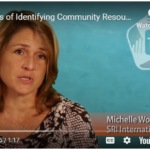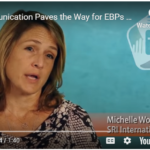Researcher-practitioner partnerships involve collaborations between researchers and practitioners (e.g., educators, state or local education agency staff) that promote the use of research in investigating and finding solutions for problems of practice.
Supporting Students with Behavioral and Emotional Needs: A Conversation with Carl Sumi
In the latest episode of The SRI Homeroom podcast, Senior Principal Education Researcher Carl Sumi joined host Kori Hamilton Biagas to discuss strategies, interventions, and recommendations for educators, schools, and researchers hoping to meet that need head-on.
Continue reading →BEST in CLASS: What Coaches and Teachers Say About It. Part 2: Teacher Perspectives
Practice-based coaching (PBC) promotes a strong collaborative partnership between teachers and coaches to facilitate the use of effective instructional practices. The PBC process includes skills instruction on BEST in CLASS practices, shared goals and action planning, implementation support, classroom observation, and reflection and feedback.
Continue reading →BEST in CLASS: What Coaches and Teachers Say About It. Part 1: Coach Perspectives
BEST in CLASS (Behavioral, Emotional, and Social Training: Competent Learners Achieving School Success) is a tier 2 (targeted) evidence-based intervention for young children with persistent and intensive challenging behaviors.
Continue reading →Handle With Care: Expanding and evaluating trauma supports for students
Now more than ever, many children and youth are exposed to potentially traumatic events, whether it be from community or school violence, natural disasters, or the sudden loss of a loved one.
Continue reading →Why Participate in Research with SRI?
Since 2019, we’ve not only engaged with educators, community members, and mental health service providers to co-author blogs about their challenges and accomplishments on the ground, but we also compiled helpful resources from our colleagues to promote collective work in the field and across the country.
Continue reading →Thinking about working with researchers at your school? See what one of our closest school partners has to say
Jennifer Donahue is a program administrator at the San Francisco Unified School District’s Student, Family and Community Support Department and has been a close partner of SRI’s Behavior Research team for many years. We recently interviewed Jennifer on what her experience has been and being involved in a researcher-practitioner partnership ...
Continue reading →Local trauma-informed care resources empower communities
Dr. Michelle Woodbridge (who has been studying prevention and intervention programs related to school-based mental health for more than 25 years) discusses the benefits of collecting and sharing information about local community resources with participants in research studies. This video was produced by the 3C Institute.
Helpful resources on cognitive behavior interventions ...
Continue reading →Researcher-practitioner partnerships in implementing & evaluating evidence-based programs in schools
Implementing and evaluating evidence-based programs (EBPs) in schools requires strong researcher-practitioner partnerships. Here’s what Dr. Michelle Woodbridge (who has been studying prevention and intervention programs related to school-based mental health for more than 25 years) says about the role of communication in implementing EBPs in schools. This video was produced by ...
Continue reading →Benefits of working at a nonprofit research institute vs. academic university
What is it like to work for a nonprofit research center? See what Dr. Carl Sumi, Senior Principal Education Researcher at SRI International, says about working at a nonprofit research institute. This video was produced by the 3C Institute.
Helpful resources on cognitive behavior interventions can be found on the Cognitive Behavioral ...
Continue reading →How to determine the quality of evidence-based programs (EBP) for schools
In this video, Dr. Michelle Woodbridge (who has been studying prevention and intervention programs related to school-based mental health for more than 25 years) discusses how to evaluate the fit of EBPs for schools. This video was produced by the 3C Institute.
Additional resources on cognitive behavior interventions can be found ...
Continue reading →









